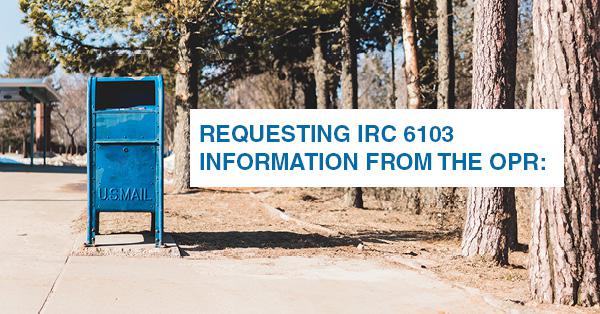REQUESTING IRC 6103 INFORMATION FROM THE OPR:

The Office of Professional Responsibility (OPR) is responsible for all matters relating to the regulation of individuals’ practice before the IRS under 31 CFR Subtitle A, Part 10 (Circular 230, Regulations Governing Practice before the Internal Revenue Service). Having exclusive responsibility for discipline imposed on “practitioners” (including appraisers), the OPR’s jurisdiction encompasses instituting disciplinary proceedings and pursuing sanctions (e.g., censures, suspensions or disbarments from practice, and appraiser disqualifications). In carrying out these responsibilities, we work with other IRS business units to safeguard confidential taxpayer information from unauthorized disclosure. Information in the OPR’s case files includes information pertaining to practitioners who are the subjects of referrals to the OPR for possible misconduct.
The OPR has created a standard section 6103 information-request letter (accessible at irs.gov on News and Guidance from OPR) for practitioners and their representatives to use to request tax information maintained in OPR case files and obtained as part of an inquiry into possible violations of the regulations governing practice before the IRS (Circular 230).
The letter functions as a request under section 6013 of the Internal Revenue Code for access to tax returns and related tax information. A practitioner, or an authorized representative on a practitioner’s behalf, can use the letter to request copies of (1) the practitioner’s own tax information; (2) relevant tax information of other taxpayers, such as clients or former clients of the practitioner; or (3) both the practitioner’s own tax information and the tax information of third parties, depending on the case.
The section 6103 information-request letter is based on certain provisions of the statute, which vary in their coverage:
- Section 6103(e)(1) and (7) provides a method for a practitioner, in their status as a taxpayer, to obtain disclosure of the practitioner’s tax information contained in the case file associated with the practitioner. More specifically, the provisions authorize a taxpayer, through a written request, to inspect and receive the taxpayer’s returns filed with the IRS and the taxpayer’s “return information” (defined in section 6103(b)(2)), unless the IRS determines that disclosure of some or all of the return information would seriously impair federal tax administration.
- With respect to another taxpayer’s returns and return information, section 6103(l)(4) authorizes disclosure, upon written request, to “any person . . . whose rights are or may be affected by an administrative action or proceeding” under Circular 230. Additionally, the same returns and return information may also be disclosed to a “duly authorized legal representative” of the person. Disclosure under this provision is limited only to returns and return information that are or may be “relevant and material” to the action or proceeding under Circular 230. Thus, a practitioner, or a practitioner’s authorized representative may use subsection (l)(4) in a Circular 230 matter or proceeding to request disclosure of relevant third-party tax information.
It is important to note that any information disclosed under section 6103(l)(4) is solely for use in, or to prepare for, the OPR action or proceeding. Any other use or disclosure of the third-party tax data is prohibited. A practitioner or representative who makes an unauthorized disclosure is subject to potential civil and criminal liability. The section 6103 information-request letter includes acknowledgments by the requester(s) of the disclosure restrictions and potential penalties for violations.
The section 6103 information-request letter is distinct from a Freedom of Information Act (FOIA) request. The section 6103 information-request letter generally will be an easier (and quicker) way to obtain the information requested and most often result in greater release of information than a FOIA request. OPR receives and directly handles section 6103 requests, whereas FOIA requests are received and processed, on a first-in, first-out basis, by Privacy, Governmental Liaison and Disclosure within the IRS, which must coordinate with OPR on the identification and release of records responsive to a FOIA request. In addition, a section 6103 request is not subject to fees for search and review time or for photocopying that apply to FOIA requests. The most significant difference is that the IRS will not release any third-party tax information in response to a FOIA request, regardless of the relevance and materiality of the information to a pending or prospective action or proceeding that could affect the rights of the practitioner making the request or on whose behalf the request is made. The third-party tax information is required to be withheld under FOIA Exemption 3, in conjunction with section 6103. Thus, a practitioner or representative’s submission of a FOIA request may be a waste of time and resources, to the extent it is necessary to submit a subsequent section 6103(l)(4) request to obtain all available information relevant to the case. Practitioners should be aware, however, that a section 6103 request submitted to the OPR will only yield responsive documents held by the OPR itself, not documents maintained in files elsewhere in the IRS.




